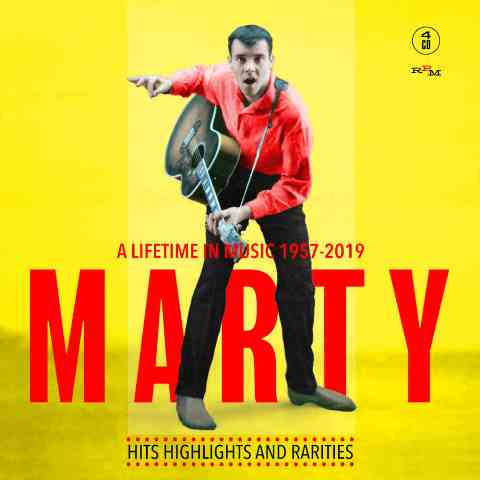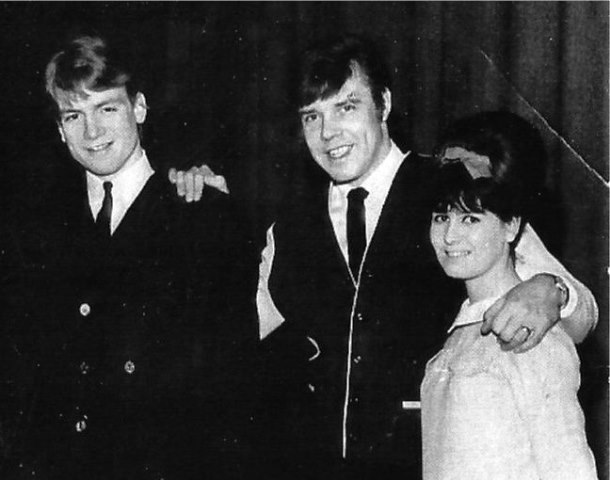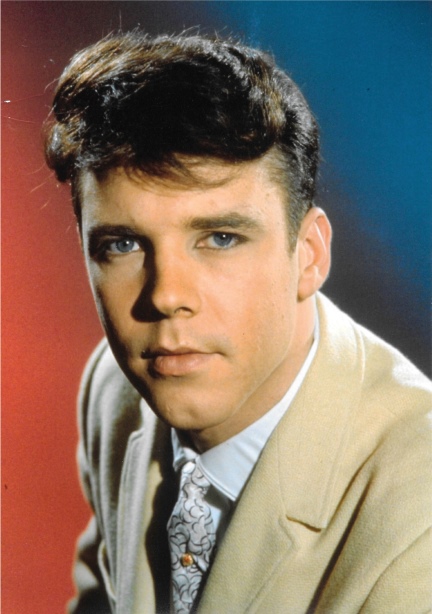Although Marty Wilde will forever be inextricably linked with the late 1950s British rock ‘n’ roll wave he rode, his career did not peter out as musical styles transformed. While he didn’t have the high-profile mutability of Cliff Richard or claim a niche like the moody Billy Fury, he was enviably chameleonic. Wilde adroitly embraced folk-rock, wrote late-Sixties hits for The Casuals and The Status Quo – “Jesamine” and “Ice in the Sun” are his – and even tackled glam rock in the Seventies with his Zappo alter-ego. With his son Ricky, he co-wrote daughter Kim’s 1981 hit “Kids in America”.
The intriguing new box set A Lifetime in Music 1957–2019 tackles this résumé across four CDs. From his October 1957 debut single “My Babe” to a pair of 2017 album tracks – despite the title, this is the most recent material included – the clamshell box includes 132 tracks. Marty Wilde turned 80 earlier this year.
 Disc Four is the most immediately interesting as it collects 32 previously unheard demos. “Jesamine”, from 1968, is included as is, from the same year, “Elizabeth Dreams”, another of his songs the pre-boogie Quo recorded. From 1963, there are versions of Alan Klein’s “A Lay-About’s Lament” and “Wasn’t it a Handsome Punch-Up” which seem bizarre choices for trial recordings as Brown had issued the former as a single during the previous year, and the pair of them recorded both songs for the 1963 film What a Crazy World.
Disc Four is the most immediately interesting as it collects 32 previously unheard demos. “Jesamine”, from 1968, is included as is, from the same year, “Elizabeth Dreams”, another of his songs the pre-boogie Quo recorded. From 1963, there are versions of Alan Klein’s “A Lay-About’s Lament” and “Wasn’t it a Handsome Punch-Up” which seem bizarre choices for trial recordings as Brown had issued the former as a single during the previous year, and the pair of them recorded both songs for the 1963 film What a Crazy World.
More noteworthy is “Your Kind of Love”, which Wilde issued as a wonderful 1964 Andrew Loog Oldham-produced B-side. In its raw form, it’s a superb girl-group-styled beat ballad. Three demos by his 1965 trio The Wilde Three – of Wilde, his wife Joyce and the pre-Moody Blues Justin Hayward – are top-notch US-styled folk-pop. “Harmonica”, which the Graham Bond Organisation recorded for the film Gonks Go Beat, is an R&B winner. Disc Four is essential.
 Disc Three comes next in the indispensability ranking as its first 21 tracks are previously unissued studio recordings made in 1959 for Radio Luxembourg which include fluffed intros and studio chat. Despite a few dropouts, the sound quality is fine. This is as close as it can be to the live sound of Wilde and his band The Wildcats. Although no information is given in the booklet on how or where this material was recorded, the band at this point probably featured future Shadows Brian Bennett and Brian Locking along with firebrand lead guitarist Big Jim Sullivan (the line-up is not given). (pictured left, The Wilde Three in 1965. From left: Justin Hayward, Marty Wilde, Joyce Wilde)
Disc Three comes next in the indispensability ranking as its first 21 tracks are previously unissued studio recordings made in 1959 for Radio Luxembourg which include fluffed intros and studio chat. Despite a few dropouts, the sound quality is fine. This is as close as it can be to the live sound of Wilde and his band The Wildcats. Although no information is given in the booklet on how or where this material was recorded, the band at this point probably featured future Shadows Brian Bennett and Brian Locking along with firebrand lead guitarist Big Jim Sullivan (the line-up is not given). (pictured left, The Wilde Three in 1965. From left: Justin Hayward, Marty Wilde, Joyce Wilde)
Whoever plays on these tracks, this is a tight, tough outfit convincingly and enthusiastically addressing their mission of recasting American rock for Britain. Wilde is heard saying to the studio engineer “if you could have more echo than you’ve ever given me, so it’s kind of as though I’m walking down a street – that atmosphere.” Presumably, that’s the archetypal lonely street. Magnificent stuff and anyone poo-pooing British rock ‘n’ roll should hear this as evidence that we had the goods.
Much of the remainder of what’s heard draws from Wilde’s singles. Disc One has the full run from 1957 to 1961 with the addition of a track from a film soundtrack. Disc Two continues the sequence until May 1964’s “Kiss me” and picks it up again with the two Wilde Three singles. Inexplicably, the intervening September 1964 “The Mexican Boy” / “Your Kind of Love” single is not included, despite being mentioned in the liner notes. His 1966 to 1971 singles are not collected.
 Hearing the singles en masse is fascinating as it’s possible to hear the naturally country inflected Wilde voice trying on styles for size and being steered towards directions which were not pursued. The US-recorded 1960 “Amapola” / “Autumn Leaves” single is in an orchestrated swing bag, obviously influenced by Bobby Darin’s then-recent This is Darin album, Surprisingly, Wilde is a good fit with the material. Another gem is the rollicking June 1960 A-side “Angry”. (pictured right, Marty Wilde in 1960)
Hearing the singles en masse is fascinating as it’s possible to hear the naturally country inflected Wilde voice trying on styles for size and being steered towards directions which were not pursued. The US-recorded 1960 “Amapola” / “Autumn Leaves” single is in an orchestrated swing bag, obviously influenced by Bobby Darin’s then-recent This is Darin album, Surprisingly, Wilde is a good fit with the material. Another gem is the rollicking June 1960 A-side “Angry”. (pictured right, Marty Wilde in 1960)
As well as six recordings from 2001, 2014 and 2017, there are also nine tracks from singles issued in 1973, 1973 and 1974. “Caterpillar” is a top pick. Released in February 1973 as by Cold Fly, it nods towards T-Rex and Alvin Stardust. “She’s a Mover”, a B-side from later that year, is also hot.
A Lifetime in Music 1957–2019 is not a linear listen as it doesn’t progress chronologically or thematically organise its contents. No matter. A lot of the music stands on its own. Its liner notes though are more problematic as they read like a disjointed series of often unrelated bullet points. The contents of the release are mostly not addressed. In contrast, things are mentioned (such as the Oldham-produced single) which are not heard. The background to the Radio Luxembourg recording should have been explained. No cogent rationale for the track selection is given.
The annotation and textual shortcomings aside, this an overdue tribute to one of British pop’s most significant figures. What’s needed next is a decent reissue of Wilde’s 1969 album Diversions.
- Next week: the unexpected reappearance of In Time: The Best of R.E.M. 1988–2003
- Read more reissue reviews on theartsdesk
- Kieron Tyler’s website















Add comment